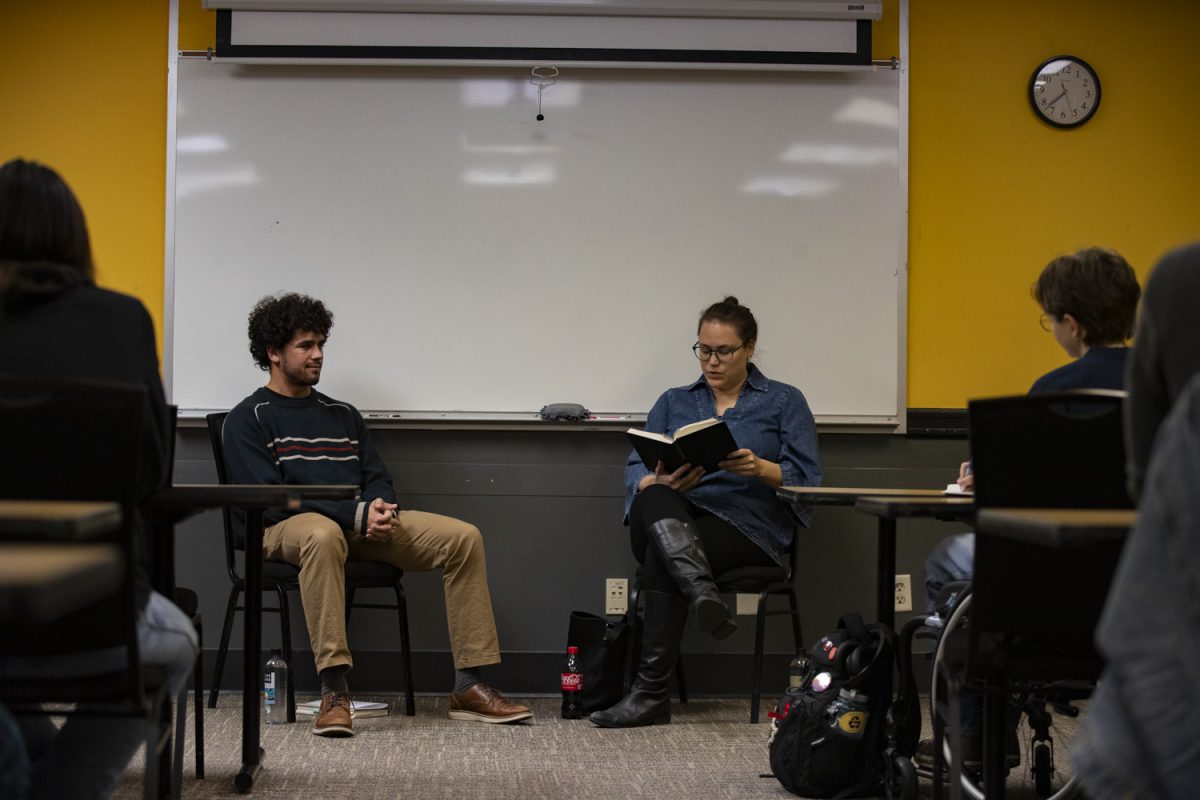Growing up in Iowa as an enrolled member of the Lumbee Tribe of North Carolina, University of Iowa professor Carrie Schuettpelz has spent her life navigating what it truly means to be Native American.
“It’s always been complicated for me in terms of feeling, like, ‘Am I Native enough?’” Schuettpelz said. “I don’t live near my tribe. I don’t live near my Lumbee family, and so growing up it was a really complicated idea about who am I and what am I allowed to claim.”
This lifelong journey ultimately led Schuettpelz to write her book, “The Indian Card: Who Gets to Be Native in America,” published on Oct. 15.
Weaving together personal memoir, in-depth interviews, and historical research, Schuettpelz’s book explores how Native people struggle to define themselves beyond bureaucratic and colonial boundaries.
The book culminates in Schuettpelz’s decision regarding the tribal enrollment of her two young children.
“The book is a journey of whether I’m going to enroll them,” Schuettpelz said.
During a reading hosted by the UI’s Native American Student Association on Wednesday evening, Schuettpelz opened with a reading of three passages.
The first described the birth of her daughter and the decision she and her husband faced about whether to check the “Indian box” on their newborn’s social security forms. In navigating this choice, Schuettpelz highlighted the complexities of shaping her daughter’s identity until the day she can define it for herself.
In the second reading, Schuettpelz explored how pre-colonial Indigenous genealogy was traditionally oral, emphasizing that enrollment itself is a colonial imposition on Indigenous identity.
The third reading summarized Schuettpelz’s interview with a Meskwaki historian who, despite deep expertise in Meskwaki ceremony, language, and culture and a lifetime spent on the Meskwaki settlement, was barred from enrollment. Though his mother was an enrolled tribal member, having a white father violated membership criteria set by the tribe’s 1939 constitution, conflicting with the traditional Meskwaki matrilineal system.
“I think it’s important that we acknowledge that federal policies created 100 or 200 years ago are still having a pretty profound impact on Native people,” Schuettpelz said.
Schuettpelz also discussed blood quantum — a federal standard requiring proof of a certain degree of Indian blood — which many tribes still use to determine enrollment eligibility.
“There’s a famous quote that the federal government only measures three things by pedigree and blood: horses, dogs, and Natives,” Schuettpelz said. “And it’s true.”
Schuettpelz said blood quantum was imposed on tribes during early colonization as a tool to erase Native populations — a tactic she fears may succeed over time. She referenced a recent Wilder Foundation study on the Red Lake Nation’s one-quarter blood quantum requirement as evidence of this risk.
RELATED: Biden’s boarding school apology met with calls for action
“What [was] found was if this tribe continued to use blood quantum, then they would be gone in 100 years,” Schuettpelz said. “They would be extinct.”
Schuettpelz said while she has not encountered many Native people who agree with the blood quantum system, changing such long standing policies remains challenging.
The reading concluded with a question and answer session, during which an attendee asked Schuettpelz if she now feels ‘Native enough’ after a lifelong struggle with identity.
Her answer: yes.
Josh Balicki, a student in UI’s Writer’s Workshop and a descendant of the Oneida Nation, shared that he had previously taken Schuettpelz’s classes and was glad to continue similar discussions outside the classroom.
“I was also moved by not only the reading, but the Q-and-A about Native identity,” Balicki said.
For Joe Maxwell, president of UI’s Native American Student Association, Schuettpelz’s struggle with identity as a Native person living far from her ancestral homeland resonated with him personally.
Maxwell is a member of the Wampanoag Tribe of Gay Head Aquinnah, a federally recognized tribe located in Massachusetts. Growing up in Iowa, Maxwell said he related to Schuettpelz’s childhood stories told in her book of her parents helping her connect to her Native heritage.
“She told a story in her book about her mom bringing in a video of the Lumbee Nation to show to her white classmates,” Maxwell said. “Stories like that reminded me of when I was younger and my mom would help me with school projects.”
Editor’s note: Josh Balicki is a former Arts Reporter for The Daily Iowan.



